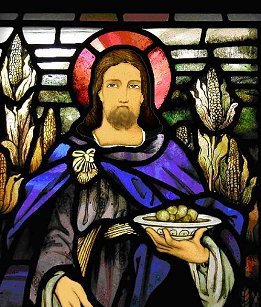“This saying is hard; who can accept it?” Jn 6:60-69

Introduction
During the regime of Pol Pot in
It is true that it is easy to be forgiven in Christianity. And it is because Christ already paid for our sins. But it is not true that it is easy to live Christianity. The demands are tough.
Many of Jesus' disciples who were listening said, “This saying is hard; who can accept it?”
The statement of Jesus: “Whoever eats my flesh and drinks my blood has eternal life, and I will raise him on the last day” is not the only statement of Jesus that is hard to accept.
Mt 6: 31-33. “So do not worry and say, 'What are we to eat?' or 'What are we to drink?' or 'What are we to wear?' All these things the pagans seek. Your heavenly Father knows that you need them all. But seek first the kingdom (of God) and his righteousness, and all these things will be given you besides.”
Mt 5: 23-24. “Therefore, if you bring your gift to the altar, and there recall that your brother has anything against you, leave your gift there at the altar, go first and be reconciled with your brother, and then come and offer your gift.”
Mt 5: 38-39. "You have heard that it was said, 'An eye for an eye and a tooth for a tooth.' But I say to you, ‘offer no resistance to one who is evil. When someone strikes you on (your) right cheek, turn the other one to him as well.’”
Mt 5: 44. “But I say to you, love your enemies, and pray for those who persecute you.”
Mt 5: 29-30. “If your right eye causes you to sin, tear it out and throw it away. It is better for you to lose one of your members than to have your whole body thrown into Gehenna. And if your right hand causes you to sin, cut it off and throw it away. It is better for you to lose one of your members than to have your whole body go into Gehenna.”
Mt 5: 32. “But I say to you, whoever divorces his wife (unless the marriage is unlawful) causes her to commit adultery, and whoever marries a divorced woman commits adultery.”
It is the spirit that gives life, while the flesh is of no avail.
In
Judge Lee of
Have we not read of two OFW who worked in
We have one priest who has only one kidney. He gave his other kidney to his elder brother. And if his kuya is alive today, it is because of him.
These are all examples of what we are capable of. And it is because God has given us the power to rise above our sinfulness, our weakness and our limitations.
Jesus then said to the Twelve, “Do you also want to leave?”
Today what question will Jesus address to us? Is it “do you also want to leave?” or would it instead be, “When will you be coming back to me?”
How often do we pray? When do we pray?
When was the last time we went to confession?
The problem perhaps is not that we are tempted to leave the company of God. The problem perhaps is that we have forgotten God and have focused our attention on other things. Or perhaps we have been living with sin in our hearts and have gotten used to it.
Conclusion
We have the distinction of being the only Christian country in this part of the world. And yet has our being Christian been advantageous to our country? Did it make our country progressive? Did it make of us a virtuous people?
If the answer is yes, then God be praised. But if the answer is no, perhaps it is not the fault of Christianity. The problem perhaps is that we have not really put into practice the teachings of Jesus in our daily lives.

